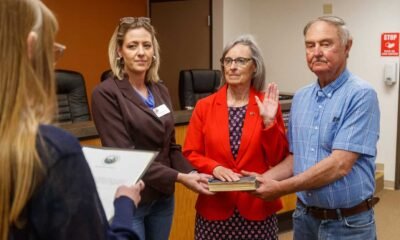2024 Election News
Arizona Court Rules: No Citizenship Checks for Federal-Only Voters in County Elections

A federal judge has denied a request from the Strong Communities Foundation of Arizona to compel county recorders to investigate the citizenship status of over 40,000 registered voters. In her 22-page ruling, Judge Krissa Lanham, a Biden nominee, concluded that the group lacks the standing to challenge the alleged failure of county officials to conduct citizenship checks for voters registered only for federal elections.
The judge further indicated that the plaintiffs did not demonstrate any harm that would warrant such an order. This dismissal extended to Yvonne Cahill, a member of the Republican Party who asserts that her vote could be diluted by noncitizen voters, ruling that her claims were unfounded.
Judge Lanham pointed out a significant issue: the timeliness of the lawsuit. The challenge, based on the supposed inaction of 15 county recorders to comply with a 2022 state law requiring citizenship inquiries, was brought to court merely 24 days before the start of early voting. The judge remarked that the last-minute nature of the suit was unacceptable.
Merissa Hamilton of Strong Communities noted that the group is currently assessing the ruling. Central to the legal dispute is Arizona’s voter registration system, which has two tiers: individuals providing proof of citizenship can vote in all elections, while those lacking such proof may register for federal elections by signing a declaration of citizenship under penalty of perjury. Approximately 42,000 voters fall into this latter category.
The plaintiffs argue that county officials are obligated to maintain voter lists according to both state and federal regulations but assert that these officials are not fulfilling this duty. Their lawsuit sought a mandate for the recorders to perform necessary checks on these federal-only voters and to provide a list of registrants without proof of citizenship to Arizona Attorney General Kris Mayes.
However, the plaintiffs presented no evidence that noncitizens are registering to vote in Arizona. They pointed to actions in other states where officials reportedly purged foreign voters from their rolls but did not substantiate their claims about Arizona’s voter registration.
Judge Lanham expressed skepticism regarding the plaintiffs’ assertions, stating they failed to provide convincing allegations to support their claims. The concerns were further underscored by Secretary of State Adrian Fontes’ press aide, Aaron Thacker, who highlighted that federal-only ballots often include groups such as Native Americans and college students who may not have immediate access to citizenship documentation.
Lanham also echoed another critical assessment from Pima County Recorder Gabriella Cazares-Kelly, who emphasized that, generally speaking, noncitizens do not attempt to register. Safeguards exist to prevent ineligible individuals from voting, and any isolated incidents of ineligible registrations are rarely encountered.
Initially, the lawsuit demanded immediate cancellation of registrations for individuals without proof of citizenship. Yet, Lanham noted that federal law restricts such actions within 90 days of an election, prompting the challengers to modify their request to merely initiating inquiries with federal agencies regarding the citizenship status of federal-only voters.
Despite scaling back their demands, Judge Lanham indicated that the timing of the request still posed significant legal hurdles, especially close to an election. Managing statewide elections entails complex logistical challenges, and the judge ruled that the plaintiffs failed to justify the diversion of essential resources from election preparations to address their concerns.
















